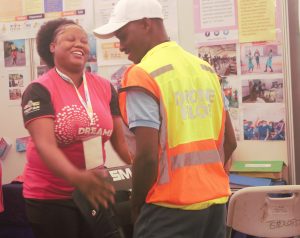
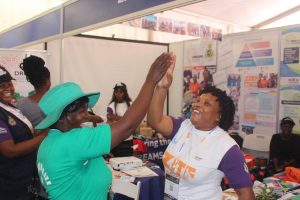
ZimPAAC took part in the 2023 63rd edition of the Zimbabwe International Trade Fare which was launched pre-Independence and adopted the current name in 1980. The ZimPAAC consortium was fully represented by officers and community cadres from three organizations namely Zim-TTECH, PZAT, and Bantwana Zimbabwe. More than 100 dignitaries visited the stand and more than 300 visitors including beneficiaries of the project. People visited the ZimPAAC stand, of interest was the economic strengthening table which had home-made materials from the beneficiaries and live testimonies done by the beneficiaries of the project on the stand.
The consortium was showcasing the DREAMS primary and secondary packages. Community cadres. Community cadres were well-versed in the program’s thematic areas and explained the objectives of the program and shared success stories. Officers were supporting the team with an in-depth explanation of all the packages and protocols for the project. Profiles, pictures samples, and tools were used to explain the DREAMS continuum for a better understanding of all the interventions. DREAMS district mentor (Tsholotsho) had an opportunity to explain the entry points in DREAMS, as well as the primary package and No Means No intervention for the 10-14 in-school beneficiaries to U. S Embassy Zimbabwe Charge d’Affaires.
Engaging men as sex partners of AGYW is of importance in the DREAMS program. During the ZITF exhibition men who visited the ZimPAAC stand had an opportunity to appreciate the DREAMS program and the great work being done in Mat-North. Distribution of condoms was done, and the PrEP champion present was able to illustrate how she creates demand for PrEP in communities and strengthens the linkages and uptake of PrEP services as well as how she works with DREAMS Ambassadors to track AGYW who will have defaulted.
The DREAMS Program Nurse played a pivotal role during the ZITF exhibition. 50 HIV self-test kits were distributed. Condom promotion and distribution were done. Demonstration of how menstrual cups are used was done to visitors who showed interest, AGYW who visited the stand were interested in the menstrual cup, 10 menstrual cups were distributed.
Articles placed.
- Meet Sitheni Ncube, our DREAMS district mentor from the Tsholotsho district. She has been mentoring girls for a year. Her dream growing up has always been to work with girls in disadvantaged communities. She has experience in counselling acquired during her nurse aid training and working with an average of 1000 girls since 2021 to date. Her dedication and passion for her work are shown through interaction with visitors and girls at ZITF. She demonstrates the importance of mentoring girls to attain a Determined, Resilient, Empowered AIDS-free, Mentored and Safe girl.
- Through innovations and regular feedback, DREAMS scaled up on mentorship in 2022, by recruiting DREAMS district mentors for each district being supported. Their role is to ensure AGYW understands the DREAMS primary package, creating demand for clinical services and linking AGYW to skills training with the aim of stirring AGYW towards employment and entrepreneurship. DREAMS Mentors are therefore actively involved in safe spaces, collaborating with community-based cadres to ensure the reduction of HIV-related risks. Furthermore, the DREAMS Mentors support AGYW and community-based mentors as well as other officers to venture into educational pathways to realize their full potential and make aspirations come true.
- # ZITF 2023: Pre-exposure prophylaxis or “PrEP” is the use of an antiretroviral medication by HIV-negative people to reduce the risk of HIV acquisition. People at substantial risk of HIV infection should be offered PrEP as an additional prevention choice. Oral PrEP is highly effective at preventing HIV when used as directed.
- PrEP champions among other community health cadres are strengthening the linkage and uptake of PrEP services and tracking among AGYW in their catchment areas. Mobilise AGYW for HIV combination prevention interventions through social interaction and snowballing. Meet Lubelihle Mkandla PrEP Champion from Nkayi in Mat North
- #ZITF 2023. DREAMS is an HIV prevention program that aims to contribute to the reduction of HIV incidences amongst AGYW utilizing a multi-sectoral approach. Clinical service provision is a critical element of the DREAMS core package as it empowers AGYW to reduce biomedical-related risks. Meet Nothando, a youth-friendly DREAMS Clinical Nurse who provides Clinical services in Tsholotsho, she has been actively providing services at the ZITF to AGYW and males in efforts to normalize access to Clinical services within communities. Thumbs up to the ZimPAAC 20 nurses who provide person-centred clinical services.
It is mid-afternoon and the bellowing sound of cows is heard in a distance. The scorching sun’s heat is unbearable and makes it very difficult to walk in the sandy soil of Bubi District in Matabeleland North province of Zimbabwe. Clouds of smoke can be seen from a distance signaling the preparation of midday meals. We walk into Thompson Maseko’s homestead in Vadala village. We go to the neatly thatched kitchen and announce our arrival.
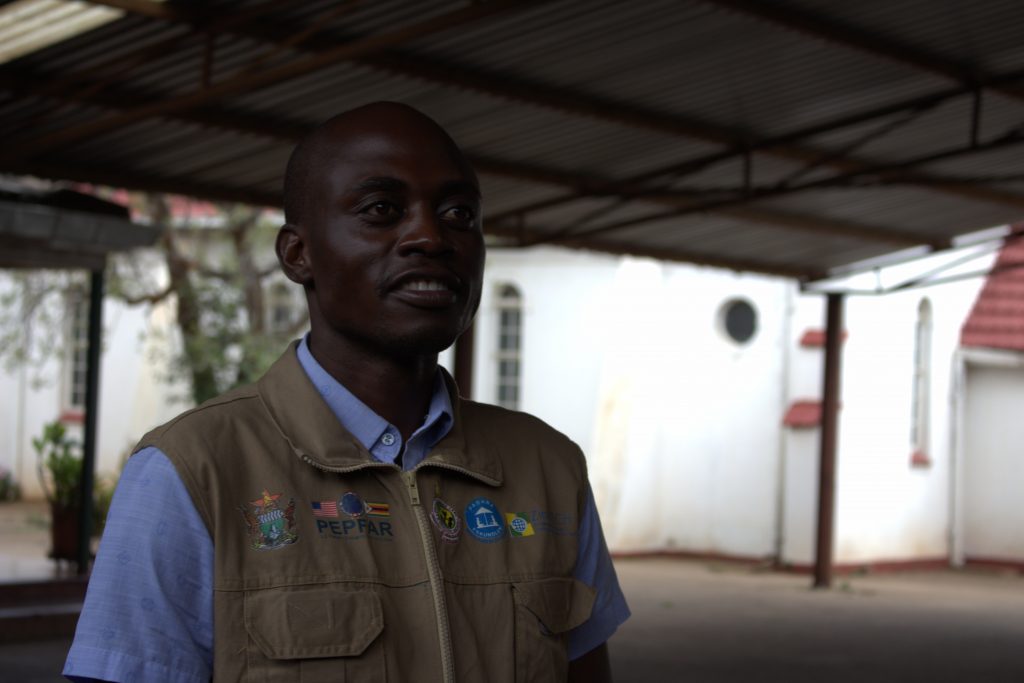
A lean, tall guy walks out followed by two little girls, the resemblance is out of this world, he certainly and without doubt, is the father. Maseko introduces himself to us and lets us know that he is the Padare Enkhundleni Men’s Forum on Gender Male Advocate in Vadala Village. We are excited because he is the one we have come to see.
Padare Enkhundlen Men’s forum on Gender is a movement of men advocating for gender justice in Zimbabwe and is one of the partners under the Zimbabwe Partnership to Accelerate AIDS Control (ZimPAAC) consortium.
The spicy aroma from the kitchen does not escape our nostrils and we hope to see his wife busy in the kitchen only to find out that he was the one doing the cooking for his young girls,
“My wife has gone to work and I am home with my daughters so I was preparing lunch for them,” he said. The look on his face does not show that he is doing something out of the ordinary, for him cooking for his daughters is as normal as any other house chore.
“As a male advocate in my community, I encourage men to challenge masculinity, there is nothing wrong with sharing house chores and helping around the house,” he sternly said.
While we are still doing the interview, Maseko excuses himself to go and serve his daughters food and we are glad to watch him do so. In 2020, He was crowned the best Male Advocate in Matabeleland North where he works with Zim-TTECH and Padare Enkundleni Men’s forum encouraging men to get circumcised and demystify myths around Patriarchy.
“I mainly do one on one interactions with men in my community and I work with my village traditional leadership to encourage men to get circumcised. So far, I have reached over 600 individuals in and around my community. In just a month I meet with around 60 men with whom I have conversations around male circumcision and HIV testing,”
“Now, I have frequent visitors who come to enquire and get insights, some of them I refer to the local clinic for further assistance. We have HIV self-test kits that we encourage people to use regularly,” highlighted Maseko.
“I have seen significant changes in my community since I started as a Male Advocate. I have seen men accompanying their wives to access health services. I have seen men help out with house chores. A lot of men in my community are now seeking health services. They no longer shun visiting health facilities and that is a good sign.” He said.
Male Advocates in Matabeleland North work with the Ministry of Health and Child Care through the Zimbabwe Partnership to Accelerate AIDS Control (ZimPAAC) consortium. Padare in Matebeleland North addresses social norms that promote patriarchal domination and all forms of abuse by men that leads to poor health-seeking behavior and gender-based violations. Male advocates work with other critical stakeholders such as National Aids Council and gender organizations to ensure a coordinated approach as well as ease of referrals. Padare engages men in the communities through safe space dialogues where men challenge harmful and toxic masculinities in an endeavour to create a gender-just society. Apart from mobilizing men for services such as Voluntary Medical Male Circumcision, sexually transmitted infections, and HIV testing services, Padare also supports health facilities with Anti-Retroviral Therapy defaulter tracking. This includes bringing back to care males that would have defaulted or deferred on ART due to different circumstances.
Through dialogues in COP20, male advocates have reached out to 95,729 men and boys since 2020 to date. These are men and boys that participated in the dialogues that were held in communities on social norms. Male advocates reached out to and referred for HTS services 36,596 men and boys. Under Voluntary Medical Male Circumcision (VMMC) a total of 2,0707 have been referred for VMMC. A total of 7722 males have been referred for STI screening and a total of 2900 male defaulters have been followed by male advocates while a total of 3,946 males were challenged to accompany their intimate partners for ANC visits.
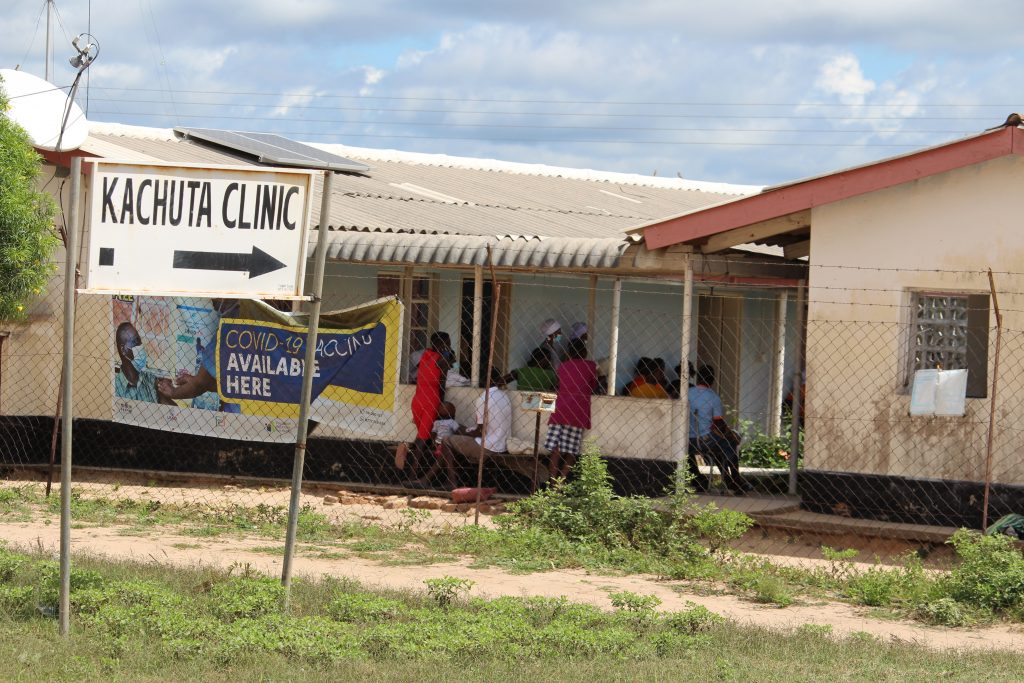
Located approximately 155 kilometres away from the Capital city, Harare, lies Guruve, one of the eight districts in the Mashonaland Central province of Zimbabwe. The district capital is the town of Guruve and around 25 kilometres away is Kachute Clinic where Zim-TTECH offers Technical assistance supporting the Ministry of Health and Child Care.
In a bid to improve viral load coverage, Zim-TTECH supports Quality Improvement initiatives to its DSD and TA sites. The Quality improvement team focuses on processes and systems, use of data to improve services, and use teams to ensure quality.
Kachuta Clinic has proved to be one facility that is doing well since the roll out of Clinic Lab Interface QI initiative, as the team has proved to be a force to reckon, with a well-documented QI corner in place with the run charts well plotted up to date with annotations.
“We have monthly team meetings, where we update each other on any issues arising during the course of that month, we set our targets and we do not work in silos. If one of us is not available then anyone among the team members can assist,” said Sister Zvidzayi Munyaradzi, the OI focal person.
These monthly meetings link and allow flow of information within the facility from the Testing area, OI desk and the Laboratory Department as well as allocation of roles and responsibilities.
It is during these meetings that the team, comprising the Nurse in charge, Primary Counsellor, OI Focal person, Primary care nurse and the Microscopist share information, responsibilities, check achievements, go over registers and note areas of collaboration. The NIC appoints one of the nurses to be the focal person of the OI/ART clinic.
Mr Mupezeni, the Microscopist highlighted how the rollout of CLI QI has assisted the facility as they are now able to book the clients in the appointment diary using code3, documentation of the Facility viral load register and transmittal register, identify clients who are due for Viral load sample collection as well use of the Vacutainer system on plasma collection,
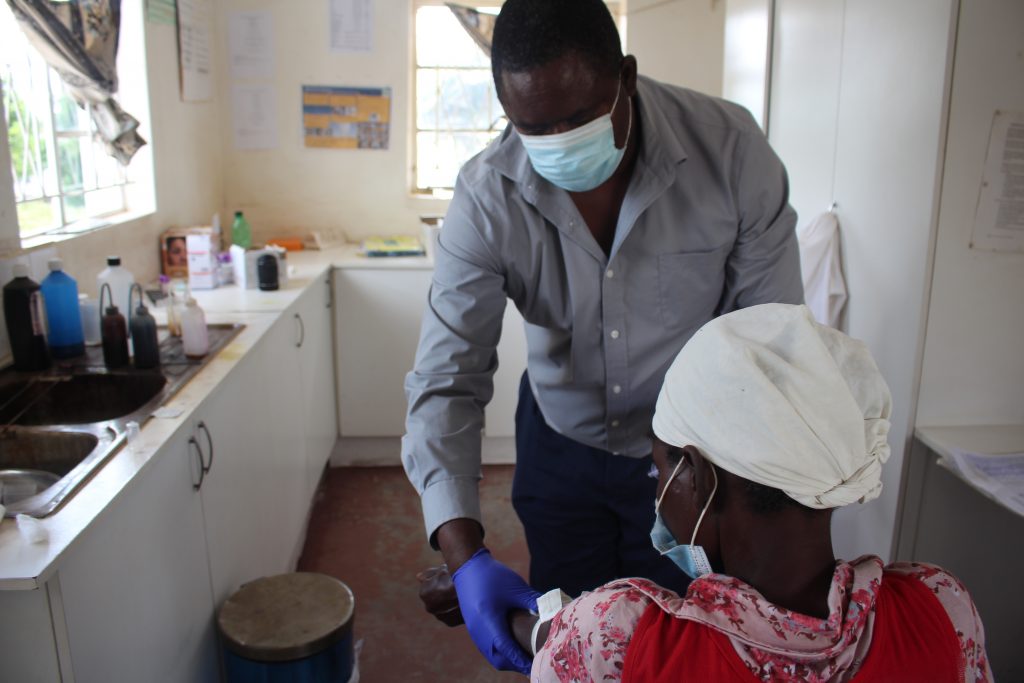
“It used to be difficult to track clients due for Viral load, but ever since we rolled out QI and adopted the cohort system it is now easy. We are now able to identify challenges and problems quickly as a team. As I chat to you right now, I can confidently say I can use the Vacutainer system for plasma collection after demonstration during CLI roll out,” said Mupezeni.
“We have clear follow up procedures, and we refer to our registers for any information needed. This is because our documentation in the registers has improved due to QI mentoring and support from the coaches,” he said.
“Drug pick up has also improved, if a client does not show up, we do follow up as this is easy to track in our registers. We have a clear appointment system in place which is very effective and a follow up of missing results tool is in place. For instance, when we send Viral load samples to the District hospital sometimes not all results are sent back to us, so we have a tool that we designed with client details that we will use to follow up on the missing results,” He said.
The Kachute team has proved to be effective as they do not work individually but as a team. This can be evident by the amount of time they have clients at the facility, they work swiftly together as a team and every team member is aware of what needs to be done and how. With walls amassed with charts and graphs, the clinic uses facility-level data to monitor the progress of the QI project using the plotted graphs.
“We do not encourage specialisation at this facility because what happens when the person specialising in a certain area is not around. We do not want to short-change our clients hence we encourage each team member to be and all-rounder,” said Sister Munyaradzi.
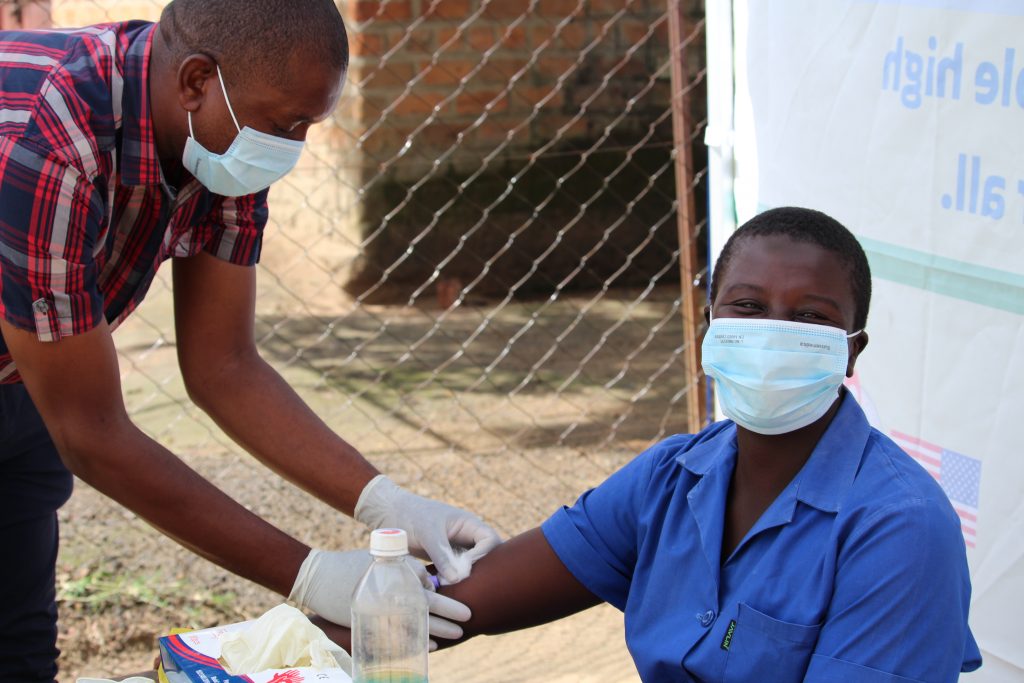
It was on the 5th of September 2017, in the evening, when Lucienne (41years) decided to administer an HIV self-test in the comfort of her home together with her husband. Like all the other days, after hectic farm work, Lucienne was tired and wanted to rest but after visiting her best friend who is the Village health worker who gave her an HIV self-test kit, she wanted to do the test that night and get it over and done with.
“I remember the day and time vividly, the 5th of September 2017, around 8 pm in the evening. 20 minutes later the results came in, and we were all HIV positive. We could not believe it at first. How can a self-test kit show that we were both positive? It could not be,” she said.
After a week of deep thinking and chatting to a close friend who advised her to visit the nearest clinic, Lucienne decided to do another test at the local Nyameni clinic in Marondera,
“My husband tagged along, though he was skeptical about it, we were both scared, but we had to be certain and sure of our HIV status. The results came and we were all HIV positive. That is when reality sunk in. We were so angry with each other at that moment,” she said.
“We were quickly initiated on ART. Back home, our Village Health worker who is also a friend stood with us and assisted us with all the information we needed, we forgave each other and started to live positively,” said ever-smiling Lucienne.
Lucienne and her husband are well known at Sambok farm as they live an open life, they do not hide that they are living with HIV and take their medication openly.
“I am not ashamed of my status, my children know our status, and taking our medication is a family business, my children remind us every day of the need to take our medication religiously,”
“Being HIV Positive is not the end of the world. One can live a healthy and normal life if they adhere to taking their medication as prescribed,” she said.
Zim-TTECH, under the Zimbabwe Partnership, to Accelerate AIDS control consortium, strives to reach hard-to-reach communities through Community outreach approaches where clinical services are provided to the community. Services such as Viral Load sample collection, HIV testing, Cervical cancer screening, ART Refill, Condom Distribution, and PrEP initiation and uptake are provided during the outreach.
Lucienne gets her Viral load sample collected, ART Refill, and Cervical cancer screening services all at once.